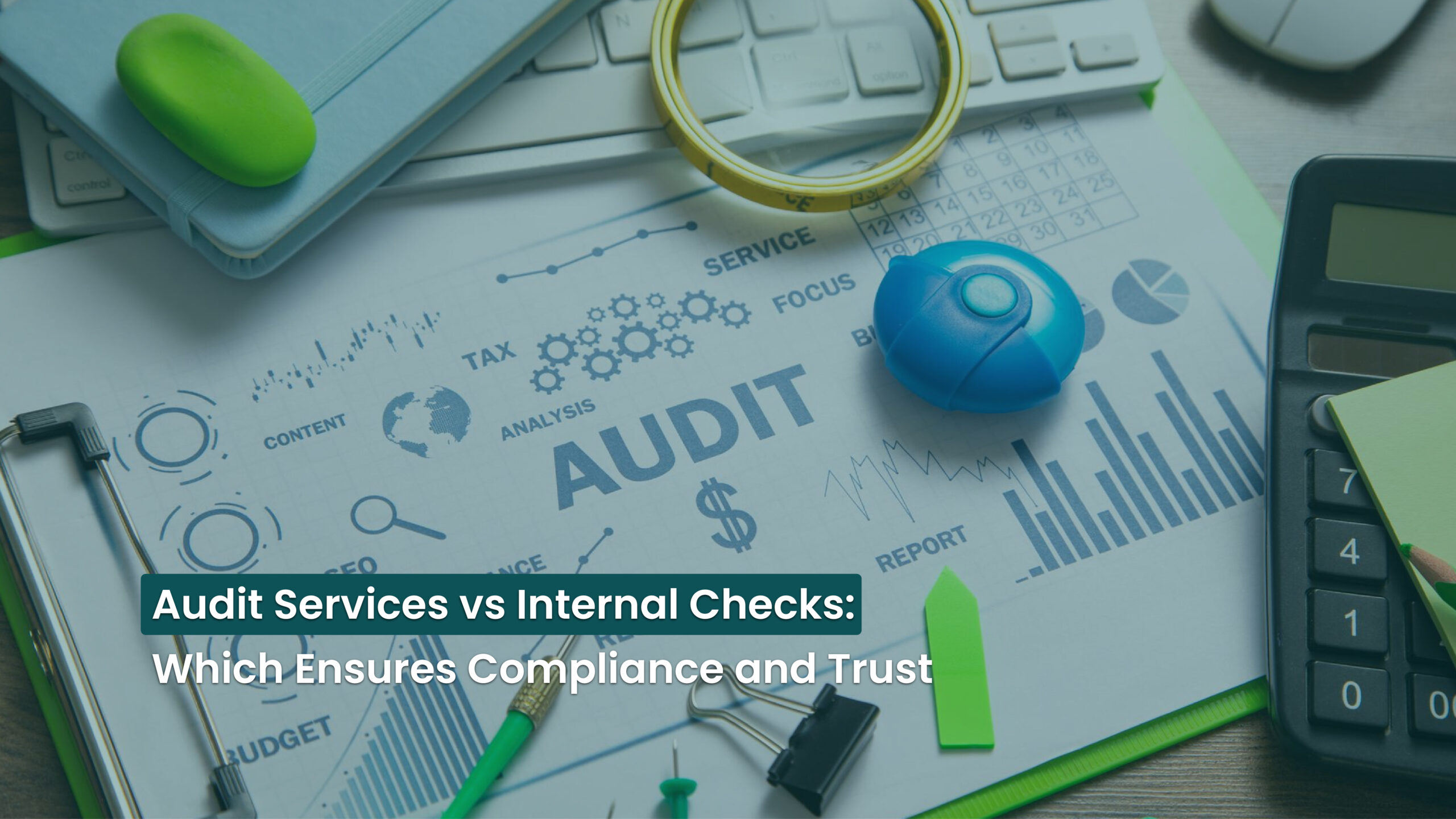You trust your in-house accountant. Your systems “seem” fine.
But then, a tax hits you out of nowhere. And suddenly, everything unravels.
This is the reality for countless business owners who believe internal checks are enough. The truth? Internal audits without external validation leave you exposed.
Understanding Audit Services in Business Terms
It is not just an obligation, it’s a smart business move.
It’s a full, professional examination of your records, systems, and compliance, conducted by neutral experts. These reports can influence:
- Investor trust
- Tax confidence
- Business valuation
- Operational transparency
Whether you’re preparing for a financial audit or need to prevent future issues, a thorough audit sends one strong signal: “We’re running a clean and credible business.
Internal Checks vs External Audit Services
| Factor | Internal Checks | External Audit Services |
| Team | Employees | Independent audit firms near me |
| Cost | Lower upfront | Strategic investment |
| Risk Detection | Limited | Comprehensive |
| Objectivity | May be biased | Fully unbiased |
| Legal Trust | Weak in audits | Strong documentation for compliance |
When Does Your Business Need External Audit Services?
Even if your company isn’t publicly listed or venture-funded, these signs mean it’s time to act:
- You’re scaling to multiple regions
- You’ve experienced internal fraud
- You’re bidding for a government contract
- You’re raising funds or selling shares
- You’ve received a tax audit notification
In these situations, relying solely on internal audit services can lead to disaster.
Financial Audits: More Than Just Numbers
Think a financial audit is about checking your income and expense sheets?
Not anymore.
Audit professionals help you:
- Correct your pricing strategies
- Identify cash leaks and hidden costs
- Forecast revenue and reduce tax liability
- Avoid red flags that trigger audits
In short, a financial audit makes sure your numbers don’t just look right, they are right.
Smart Way to Manage Audits and Compliance
Imagine a tool that tracks every step, stores evidence, and keeps your entire compliance process transparent. That’s what an audit management system does.
Top-performing businesses use this system to:
- Stay ahead of changing tax laws
- Monitor risk indicators in real time
- Keep internal and external audit processes aligned
- Generate reports for investors or regulators instantly
It’s not just smart, it’s essential.
How to Find the Right Audit Firm Near You?
So you’ve realized your business needs help. But how do you choose among the many audit firms near me?
Here’s what you should look for:
- Industry experience (retail, SaaS, manufacturing, etc.)
- Certification and compliance knowledge
- Use of modern audit management systems
- Post-audit business advisory services
Don’t just hire a checker — hire a partner who thinks strategically about your growth.
Strategies to Make Audit Work For Your Business, Not Against It
Whether you’re a startup, SME, or an established company, it’s not just about choosing between internal checks and external audit services, it’s about using them strategically together.
Here are 6 real-world strategies that protect your business, improve performance, and build trust:
1. Blend Internal Checks with External Audits
Relying only on internal reviews can create blind spots. But ignoring your team’s insights is also risky. The best approach?
Use internal audit services monthly, and schedule external audits annually.
This rhythm catches daily inefficiencies while letting professionals validate your compliance in depth.
2. Adopt a Smart Audit Management System Early
Don’t wait for chaos to strike.
A reliable management system helps track all processes, from employee expenses to policy violations in real time. This system ensures every (internal or external) starts with clarity, not confusion.
Bonus: It simplifies reporting during a tax.
3. Train Your Team on Red Flags
Your staff isn’t just for execution — they’re your first line of defense.
Train them to identify common red flags, like:
- Duplicate invoices
- Missing receipts
- Vendor inconsistencies
- Manual tax entries
This habit alone can reduce your audit risk by up to 40%, especially during a financial audit.
4. Don’t Just Fix Problems — Document the Fixes
Every time your team uncovers a compliance issue, document how it was resolved.
This record becomes part of your audit trail, and if you’re ever called into a tax audit, this simple step could save you thousands in penalties.
5. Choose Audit Firms That Understand Your Industry
Not all firms near me offer the same value.
Pick one that has experience in your business model (e.g., SaaS, real estate, manufacturing). They’ll know which risks to flag, which benchmarks to apply, and how to guide you beyond compliance toward growth.
6. Treat Your Financial Audit as a Strategic Asset
Too many business owners fear exams. But the best businesses treat audits as opportunities:
To renegotiate investor terms
To optimize tax strategies
To uncover cash leakages
To prepare for acquisitions
The difference? Mindset + the right audit partner.
Audit Costs vs Business Risks: Which Hurts More?
Let’s be honest, a professional audit comes at a cost.
But so does:
- Failing a tax audit
- Losing investor trust
- Operational errors that bleed profit
- Reputation damage due to non-compliance
One missed VAT entry once cost a mid-sized firm £65,000 in penalties. They could’ve avoided that with a £7,500 external financial audit.
Internal Checks Matter, But They’re Not Always Enough to Protect Your Business
We’re not saying internal checks are useless. In fact, internal audit services are great for:
- Spotting inefficiencies
- Monitoring daily processes
- Aligning teams on compliance goals
But relying only on internal audits is like checking your own blind spot while changing lanes. You need an extra mirror — and that’s what an external audit provides.
Real Business Wins from Audit Services
- A UAE-based startup cut 18% in tax liability through a well-timed tax audit review.
- A UK e-commerce business secured £1M in funding after presenting a third-party financial audit.
- A food chain uncovered inventory theft through an external audit management system they adopted after internal checks failed.
These are not stories, these are case studies.
How Our Experts Help You Stay Ahead?
At Msafdar, we do more than audit your finances — we protect your business.
We offer:
- Comprehensive financial audits tailored to your industry
- Emergency support during tax audits
- Implementation of enterprise-grade management systems
- Continuous risk analysis through modern tools
- Consultation from the top audit firms near you
We’re not your typical auditors, we’re your business compliance partners.
FAQs:
Q1. What’s the best time to get an audit?
Before you scale, fundraise, or face a tax audit — not after.
Q2. Can internal audit services be outsourced?
Yes. And many companies do this to avoid bias and maintain focus.
Q3. Do audit firms offer strategic advice?
Yes, especially firms using modern audit management systems and risk-based approaches.
Q4. How often should businesses perform a financial audit?
Ideally, once a year or before major business events (investment, M&A, expansion).
Q5. What if I just need a quick compliance check?
Start with a consultation. Most top audit firms near me offer one — and it can uncover surprising issues.




